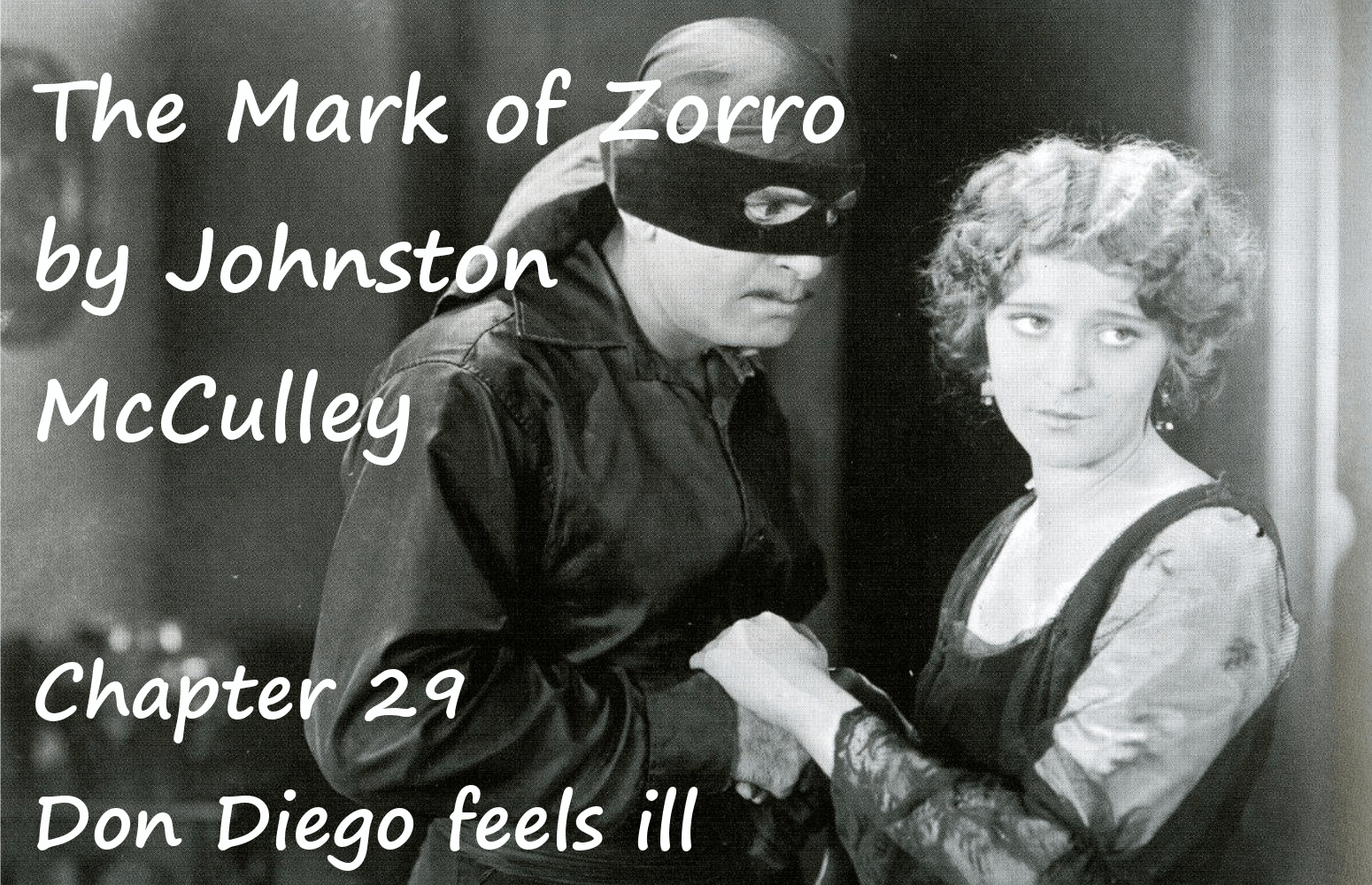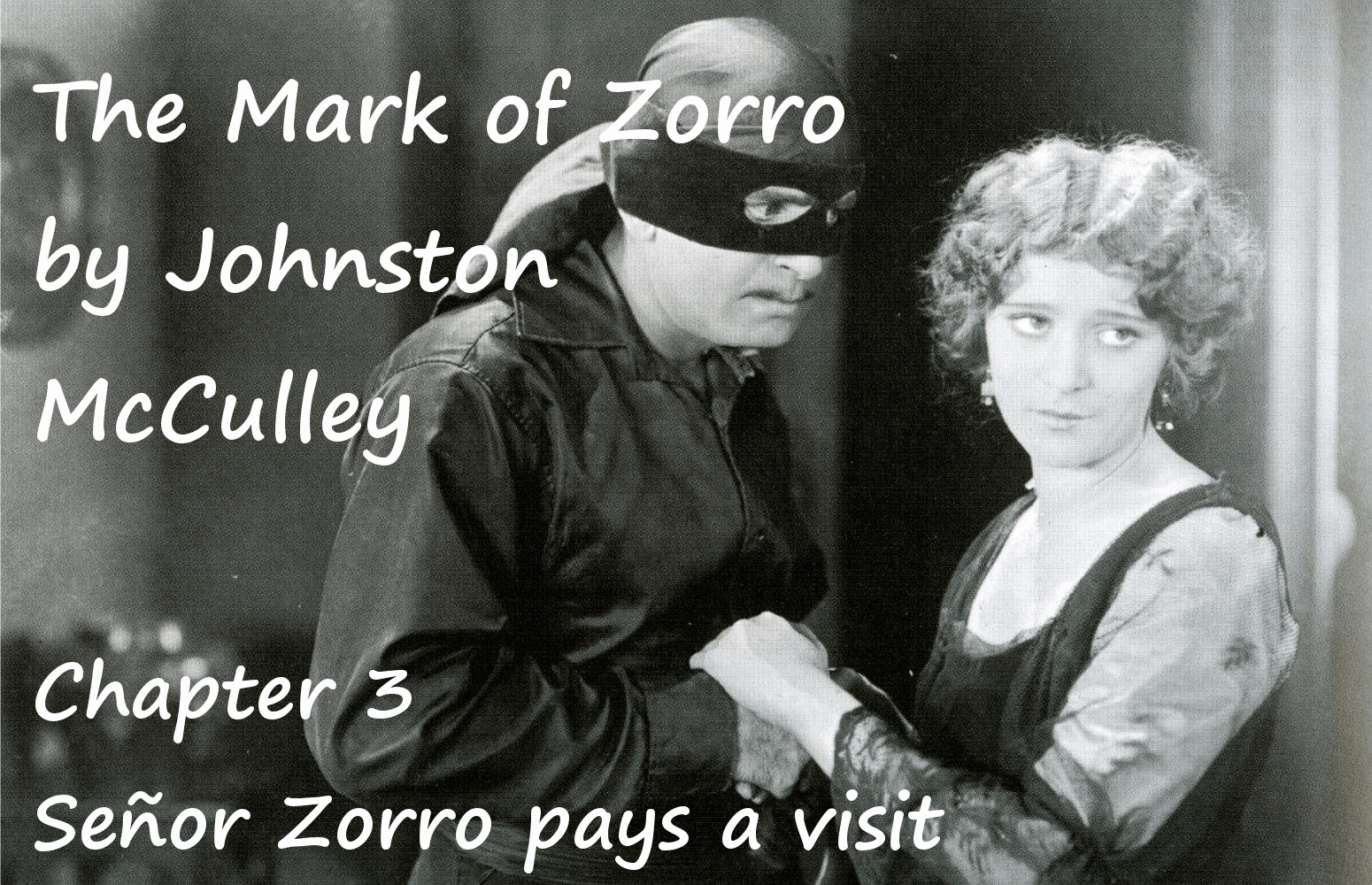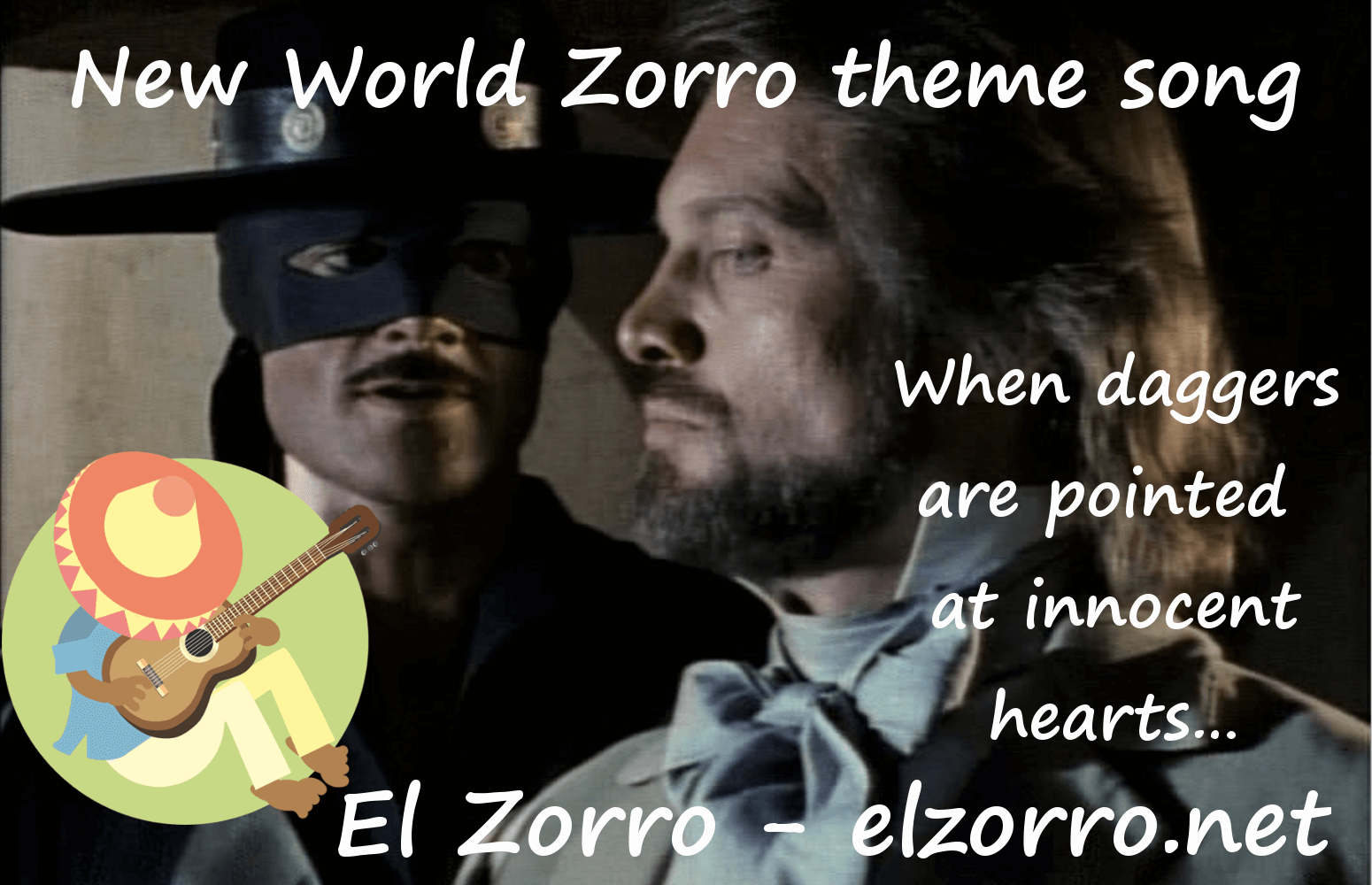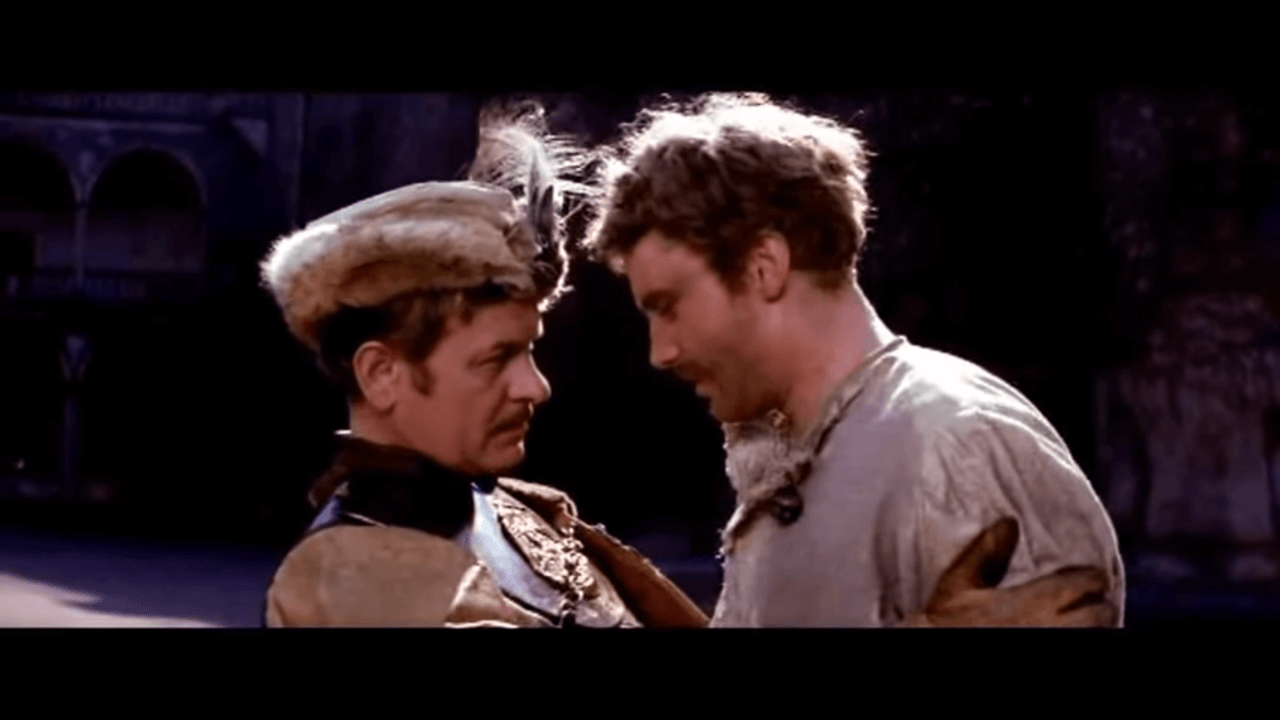The Mark of Zorro chapter 29 Don Diego feels ill
The Mark of Zorro chapter 29 Don Diego feels ill
Author McCulley, Johnston, 1883-1958
Title The Mark of Zorro
Note Published serially under the title: The curse of Capistrano.
Language English
Copyright Status Public domain in the USA.
One hour after Don Carlos Pulido and his ladies had been incarcerated in the carcel, Don Diego Vega, dressed most fastidiously, made his way slowly on foot up the slope to the presidio to make his call on his excellency, the governor.
He walked with swinging stride, gazing both to right and left as if at the hills in the distance, and once he stopped to observe a blossom that bloomed beside the path. His rapier was at his side, his most fashionable one with its jeweled hilt, and in his right hand he carried a handkerchief of flimsy lace, which he wafted this way and that like a dandy, and now and then touched it to the tip of his nose.
He bowed ceremoniously to two or three caballeros who passed him, but spoke to none beyond the necessary words of greeting, and they did not seek conversation with him. For, remembering that they had thought Don Diego Vega was courting the daughter of Don Carlos, they wondered how he would take the matter of her imprisonment along with her father and mother. They did not care to discuss the matter, for their own feelings were high, and they feared they might be betrayed into utterances that might be termed treasonable.
Don Diego came to the front door of the presidio, and the sergeant in charge called the soldiers to attention, giving Vega the salute due his station in life. Don Diego answered it with a wave of his hand and a smile, and went on to the comandante’s office, where the governor was receiving such caballeros as cared to call and express their loyalty.
He greeted his excellency with carefully chosen words, bowed over his hand, and then took the chair the governor was kind enough to indicate.
“Don Diego Vega,” the governor said, “I am doubly glad that you have called upon me to-day, for in these times a man who holds high office would know his friends.”
“I should have called sooner, but I was away from my house at the time you arrived,” Don Diego said. “You contemplate remaining long in Reina de Los Angeles, excellency?”
“Until this highwayman, known as Señor Zorro, is either slain or taken,” the governor said.
“By the saints! Am I never to hear the last of that rogue?” Don Diego cried. “I have heard of nothing else for these many days. I go to spend an evening with a fray, and in comes a crowd of soldiers chasing this Señor Zorro. I repair to the hacienda of my father to get me peace and quiet, and along comes a crowd of caballeros seeking news of Señor Zorro.”
These be turbulent times! A man whose nature inclines him to music and the poets has no right to exist in the present age!”
“It desolates me that you have been annoyed,” the governor said, laughing. “But I hope to have the fellow soon, and so put an end to that particular annoyance. Captain Ramón has sent for his big sergeant and his troopers to return. I brought an escort of twenty. And so we have ample men to run down this Curse of Capistrano when next he makes his appearance.”
“Let us hope it will end as it should,” said Don Diego.
“A man in high office has many things with which to contend,” the governor went on. “Look at what I was forced to do this day! I am called upon to put in prison a man of good blood, and his lady wife and tender daughter. But the state must be protected.”
“I suppose you mean Don Carlos Pulido and his family?”
“I do, caballero.”
“Now that it is called to my mind again, I must say a few words regarding that,” Don Diego said. “I am not sure that my honor is not involved.”
“Why, caballero, how can that be?”
“My father has ordered that I get me a wife and set up my establishment properly. Some days ago I requested of Don Carlos Pulido permission to pay my addresses to his daughter.”
“Ha! I understand! But you are not the betrothed of the young lady?”
“Not yet, excellency.”
“Then your honor is not involved, Don Diego, that I can see.”
“But I have been paying court to her.”
“You may thank the saints that it has gone no further, Don Diego. Think how it would look if you were allied with this family now! As for getting you a wife—come north with me to San Francisco de Asis, caballero, where the señoritas are far more lovely than here in your southland.
“Look over those of good blood, and let me know your preference, and I’ll guarantee that the lady will listen to your suit and accept your hand and name. And I can guarantee, also, that she will be of a loyal family with which it will be no shame to make a contract. We shall get you a wife of the proper sort, caballero.”
“If you will pardon me, is it not taking stern measures to have Don Carlos and his ladies thrown into the carcel?” Don Diego asked, flicking dust from his sleeve.
“I find it necessary, señor.”
“Do you think it will add to your popularity, excellency!”
“Whether it does or not, the state must be served.”
“Men of good blood hate to see such a thing, and there may be murmurings,” Don Diego warned. “I should hate to see your excellency make a wrong step at this juncture.”
“What would you have me do?” the governor asked.
“Place Don Carlos and the ladies under arrest, if you will, but do not incarcerate them. It is unnecessary; they will not run away. Bring them to trial as gentle folk should be brought to trial.”
“You are bold, caballero.”
“By the saints, am I talking too much?”
“It were better to leave these matters to the few of us who are trusted with attention to them,” the governor said. “I can understand, of course, how it irks a man of good blood to see a don thrown into a carcel, and to see his ladies treated likewise, but in such a case as this—”
“I have not heard the nature of the case,” Don Diego said.
“Ha! Perhaps you may change your mind when you learn it. You have been speaking of this Señor Zorro. What if I tell you that the highwayman is being shielded and protected and fed by Don Carlos Pulido?”
“That is astonishing!”
“And that the Doña Catalina is a party to the treason? And that the lovely señorita has seen fit to talk treasonably and dip her pretty hands into a conspiracy against the state?”
“This is past belief!” Don Diego cried.
“Some nights ago Señor Zorro was at the Pulido hacienda. Warning was fetched the comandante by a native who is loyal. Don Carlos aided the bandit in tricking the soldiers, hid him in a closet, and when Captain Ramón was there alone, this highwayman stepped from the closet and attacked him treacherously and wounded him.”
“By the saints!”
“And while you were gone and the Pulidos were your house guests, señor, Señor Zorro was in your house, speaking to the señorita, when the comandante walked in upon them. And the señorita grasped Captain Ramón by the arm and annoyed him until this Señor Zorro had made good his escape!”
“It is past comprehension!” Don Diego exclaimed.
“Captain Ramón has placed before me a hundred such items of suspicion. Can you wonder now that I had them placed in carcel? Did I merely have them put under arrest, this Señor Zorro would combine forces with them and aid them to escape.”
“And your intentions, excellency?”
“I shall keep them in carcel while my troopers run down this highwayman. I shall force him to confess and implicate them—and then they shall have a trial.”
“These turbulent times!” Don Diego complained.
“As a loyal man—and I hope an admirer of mine—you should hope to see foes of the state confounded.”
“I do! Most sincerely do I! All real foes of the state should receive punishment.”
“I am joyed to hear you say that, caballero!” the governor cried, and he reached across the table and grasped Don Diego fervently by the hand.
There was some more talk that amounted to nothing, and then Don Diego took his leave, for there were other men waiting to see the governor. After he had left the office the governor looked across at Captain Ramón and smiled.
“You are right, comandante,” he said. “Such a man could not be a traitor. It would tire him too much to think treasonable thoughts. What a man! He must be enough to drive that old fire-eater of a father of his insane!”
Don Diego made his way slowly down the hill, greeting those he passed, and stopping again to regard the little flowers that blossomed by the wayside. At the corner of the plaza he met a young caballero who was glad to call him friend, one of the small band of men who had spent the night at Don Alejandro’s hacienda.
“Ha! Don Diego, a fair day to you!” he cried. And then he lowered his voice and stepped nearer: “Has, by any chance, the man we call leader of our league of avengers, sent you a message this day?”
“By the bright blue sky—no!” Don Diego said. “Why should the man?”
“This Pulido business. It seems an outrage. Some of us have been wondering whether our leader does not intend to take a hand in it. We have been anticipating a message.”
“By the saints! Oh, I trust not!” Don Diego said. “I could not endure an adventure of any sort to-night. I—er—my head aches, and I fear I am going to have a fever. I shall have to see an apothecary about it. There are shiverings up and down my spine, also. Is not that a symptom? During the siesta hour I was bothered with a pain in my left leg just above the knee. It must be the weather!”
“Let us hope that it will not result seriously,” laughed his friend, and hurried on across the plaza.



